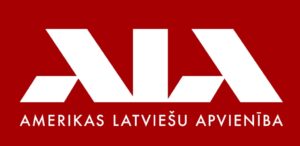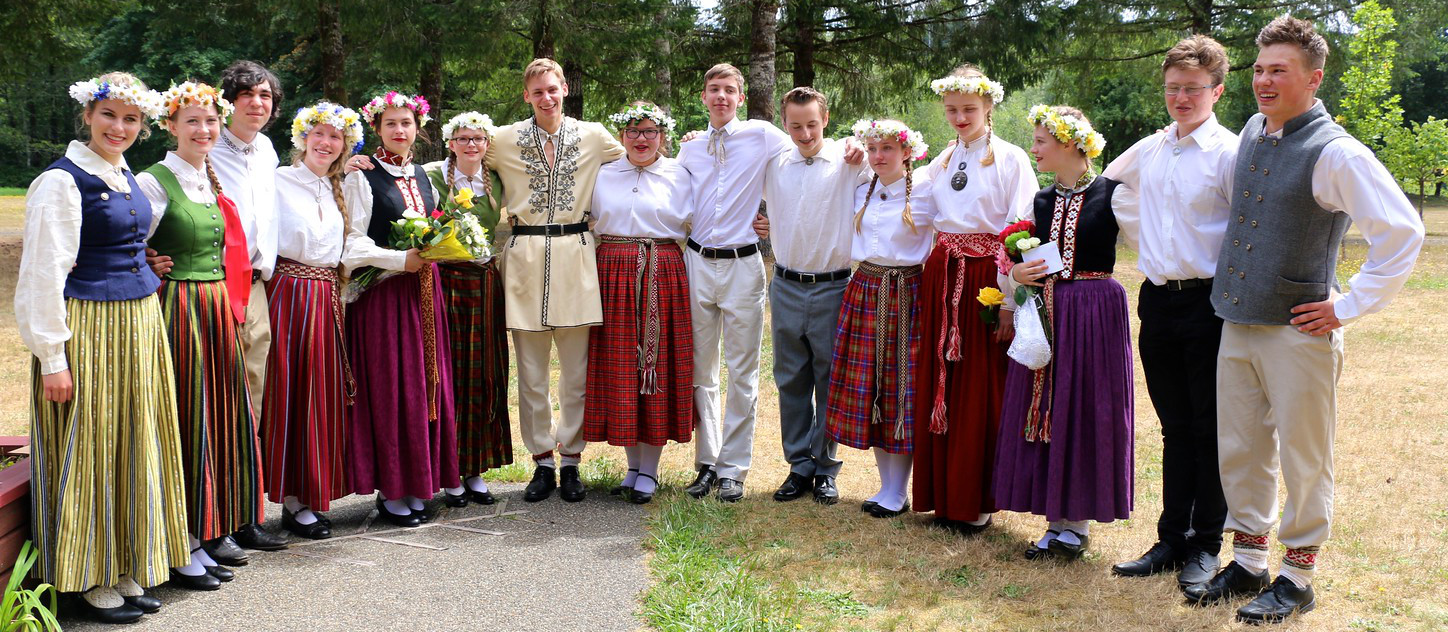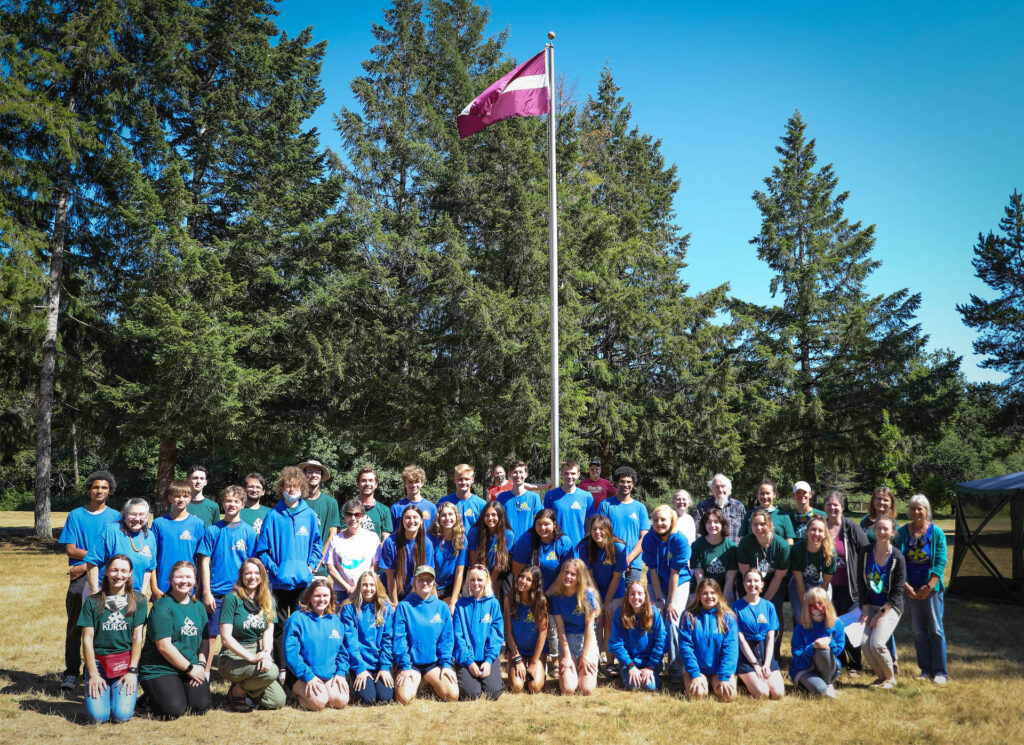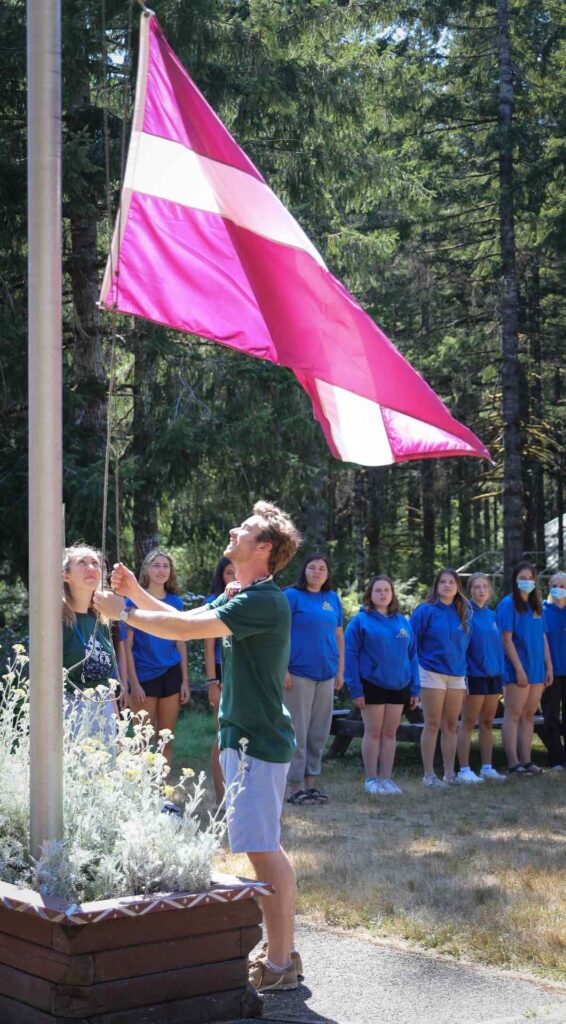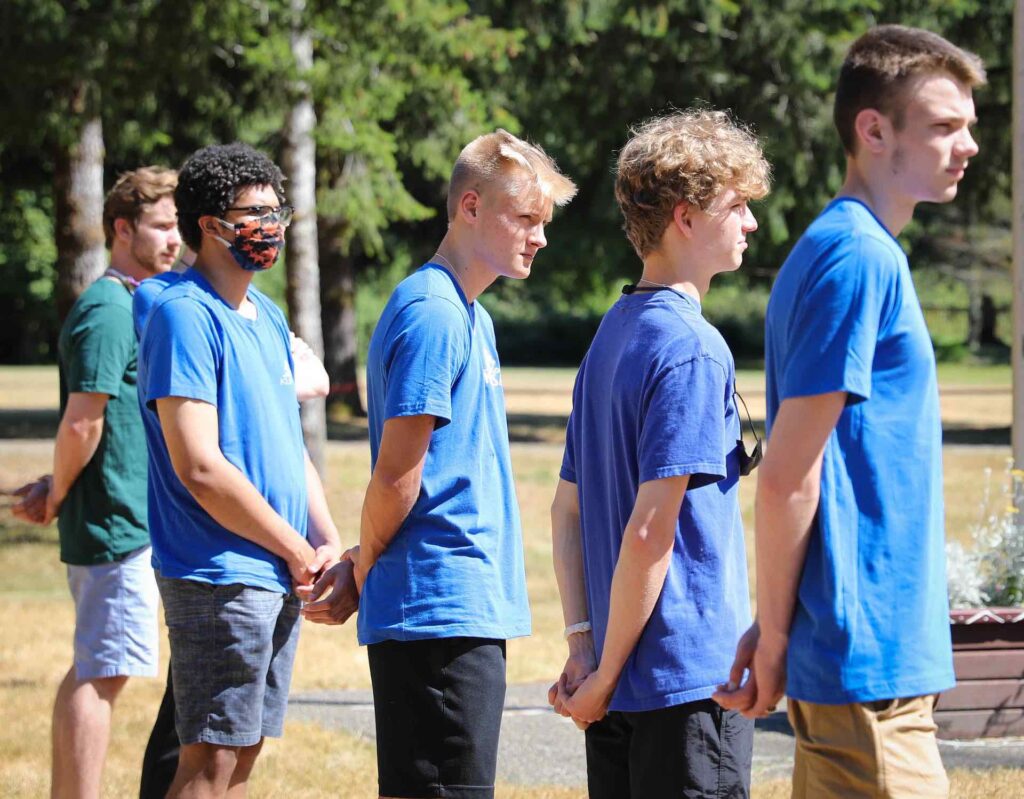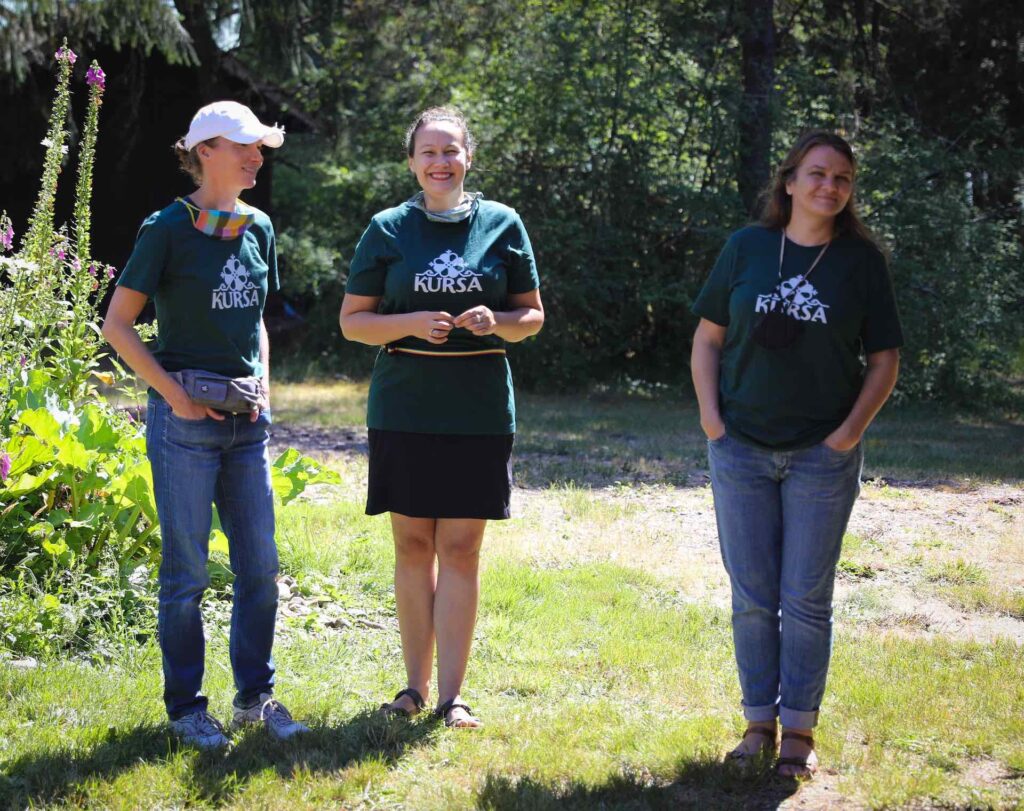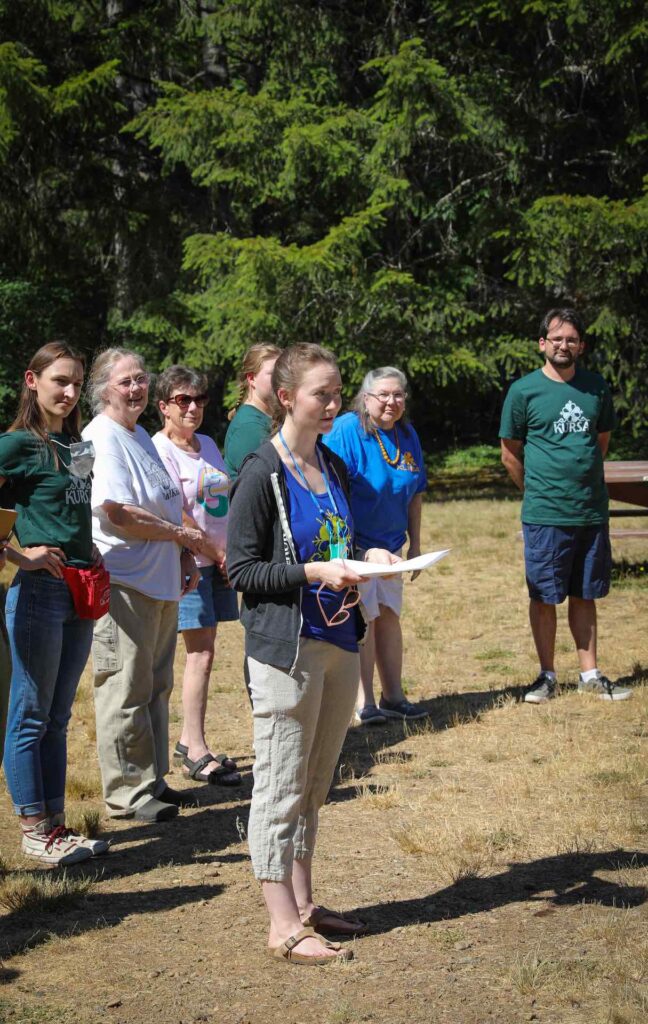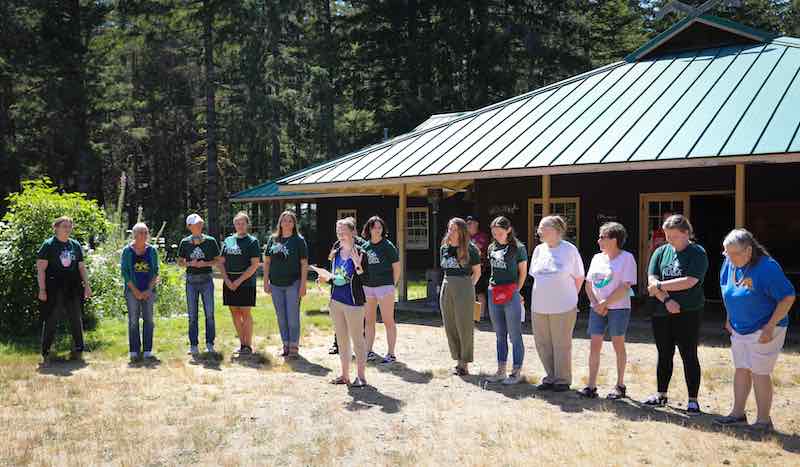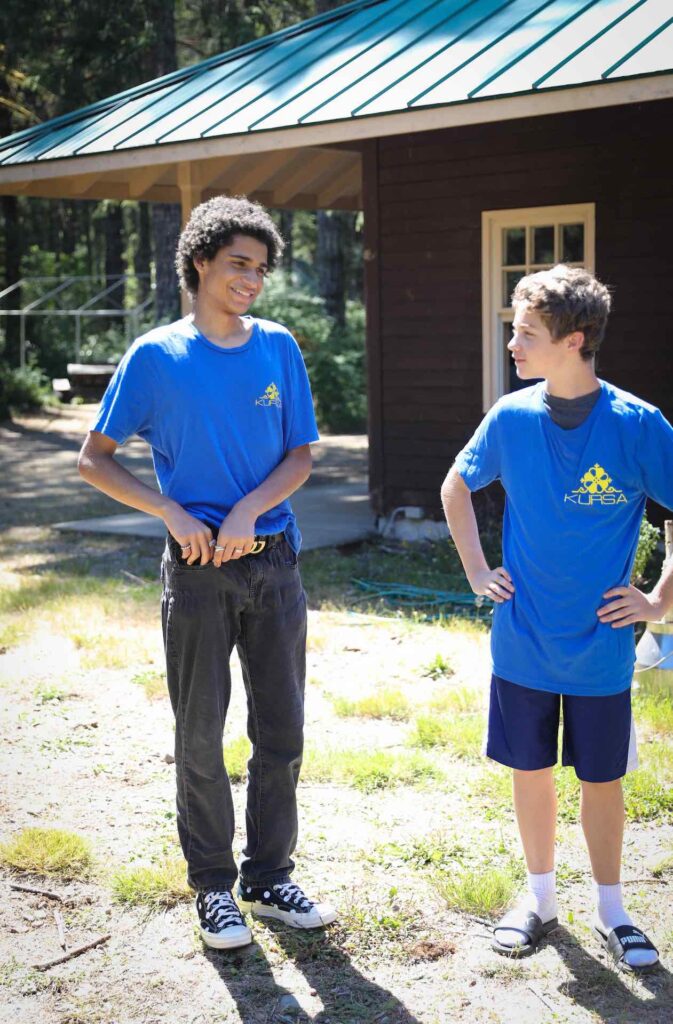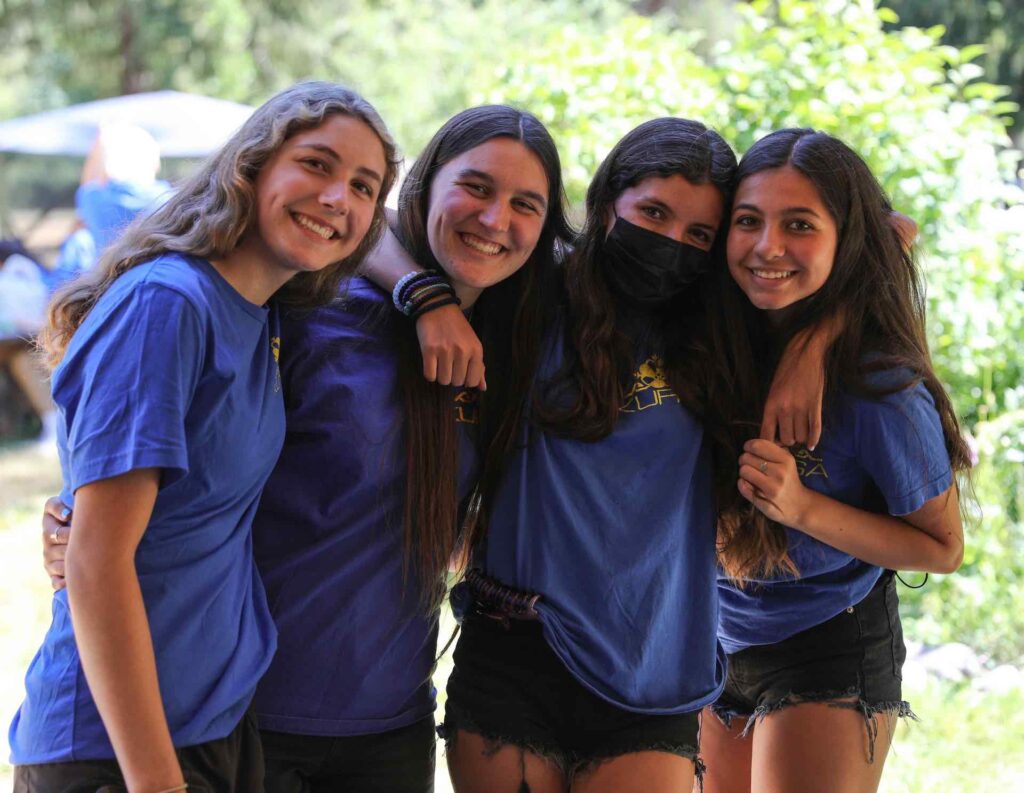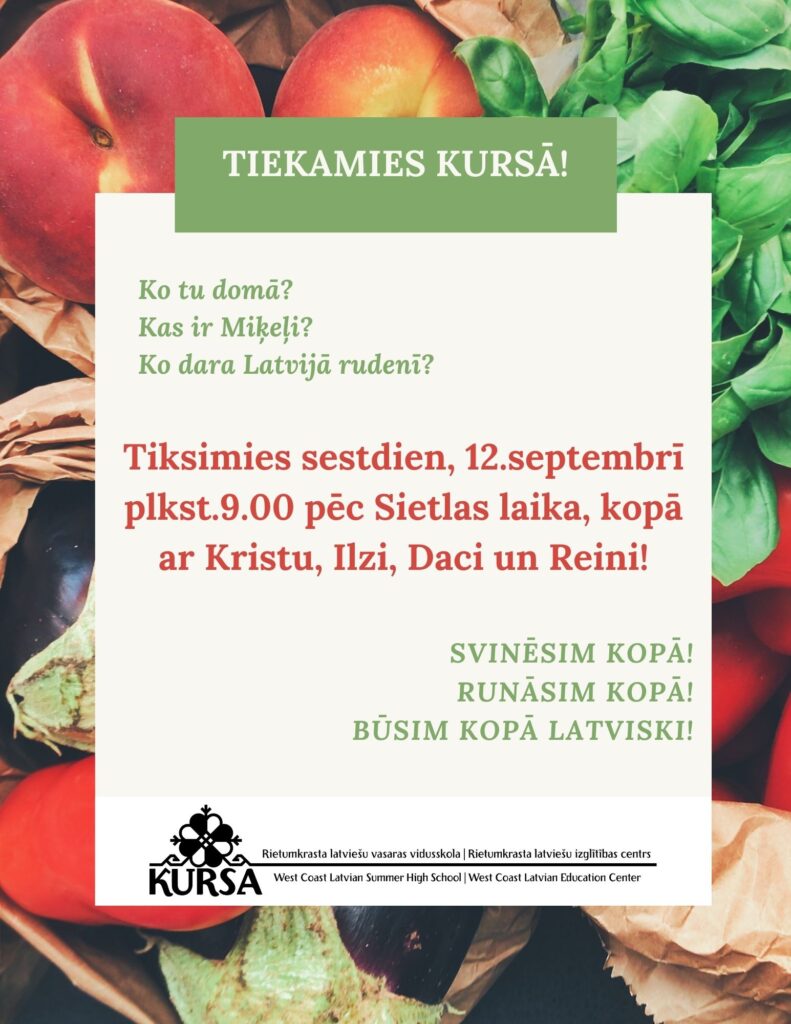Sveiks! Please check out the updated Our Teachers page, to see who is returning to teach this year as well as see some new names!
Kursa 2021 | Week 3
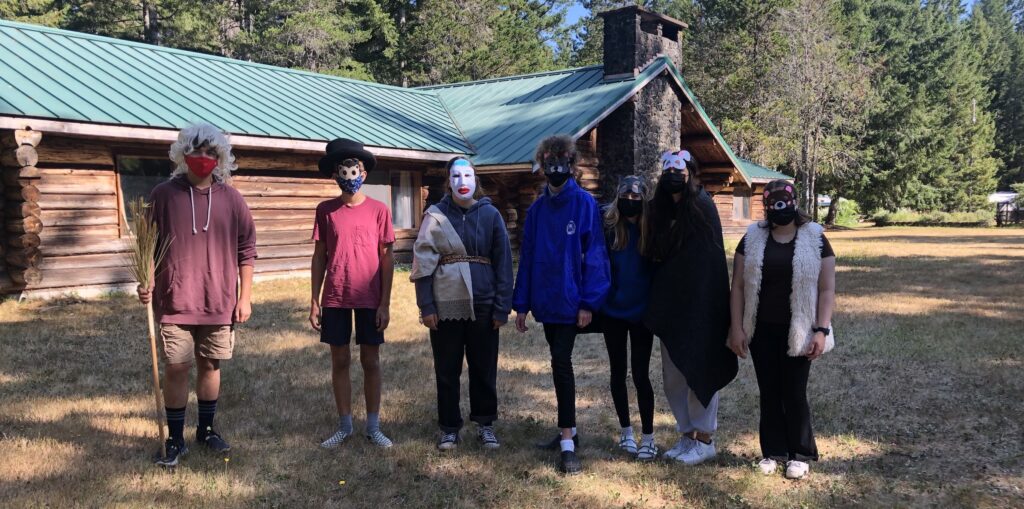
Kam ir jāsalūzst pirms to var lietot? // What has to break before you can use it?
[Ola // an egg] — Anais Mohseni
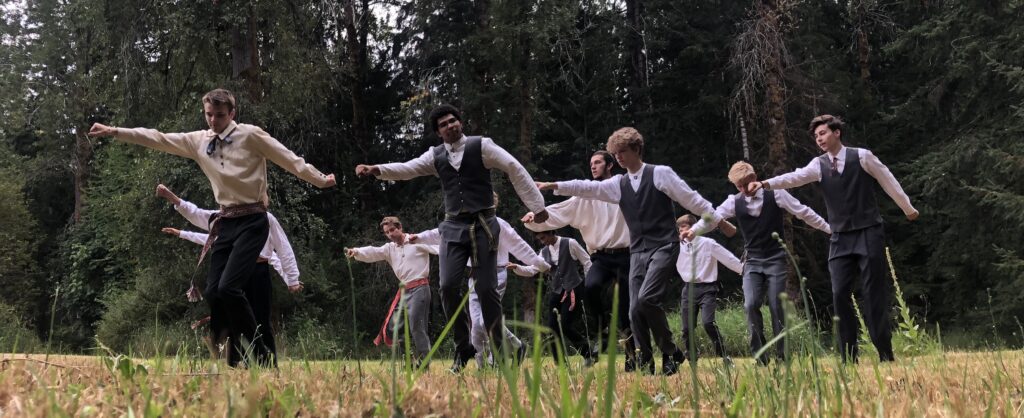
2021.g. | Otrā nedēļa Kursā
Sveicieni no Kursas, kur mēs esam pavadījuši jau divas pilnas nedēļas! Otrajā nedēļā daudz ko paspējām: Iemācījāmies dančus un baudījam Kursas muzikantu pavadījumu, iepazināmies ar skolēnu un darbinieku talantiem (un beztalantiem!), un nedēļu beidzām ar Dvīņu vakaru, Kursīno un vienkrāsaino balli.
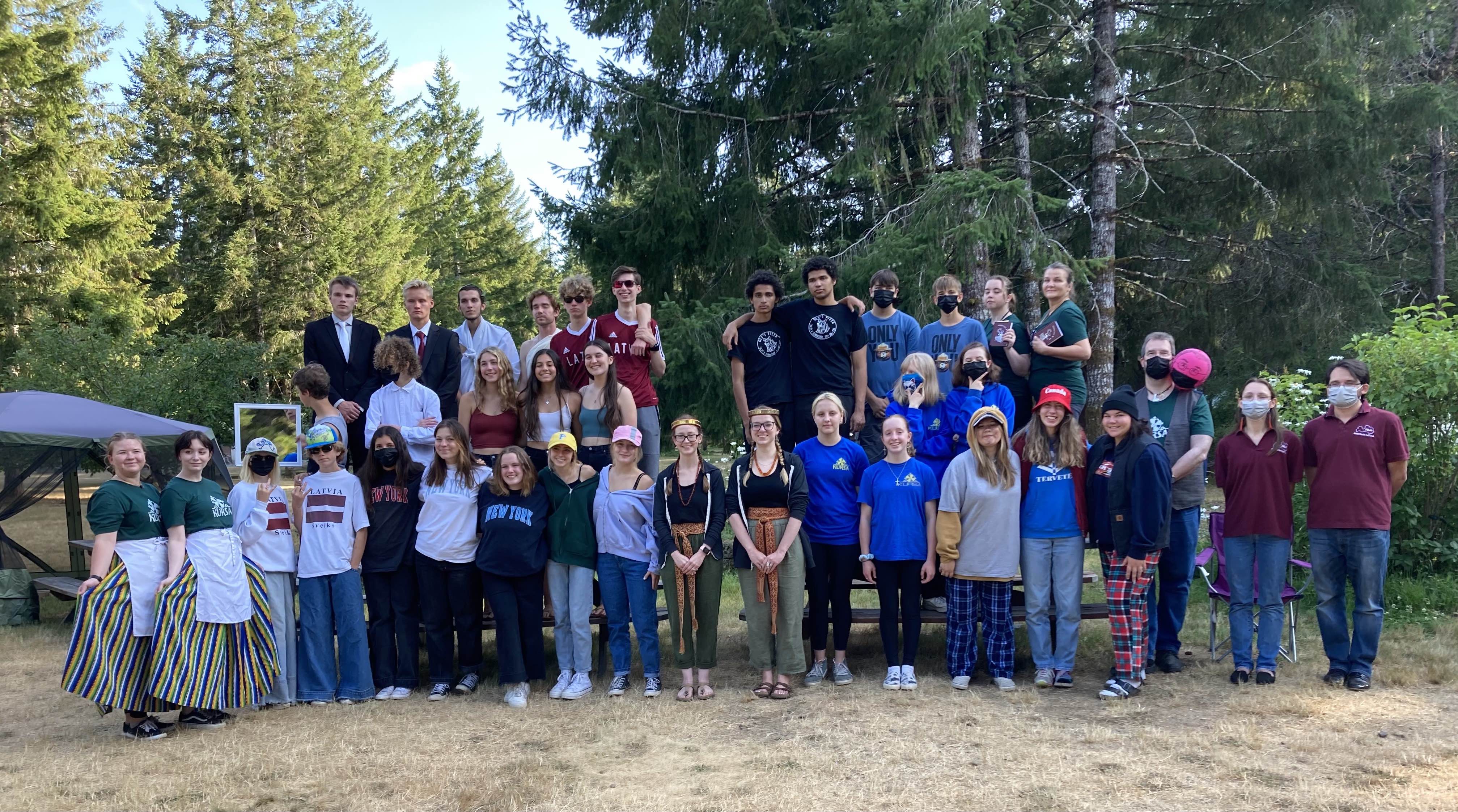
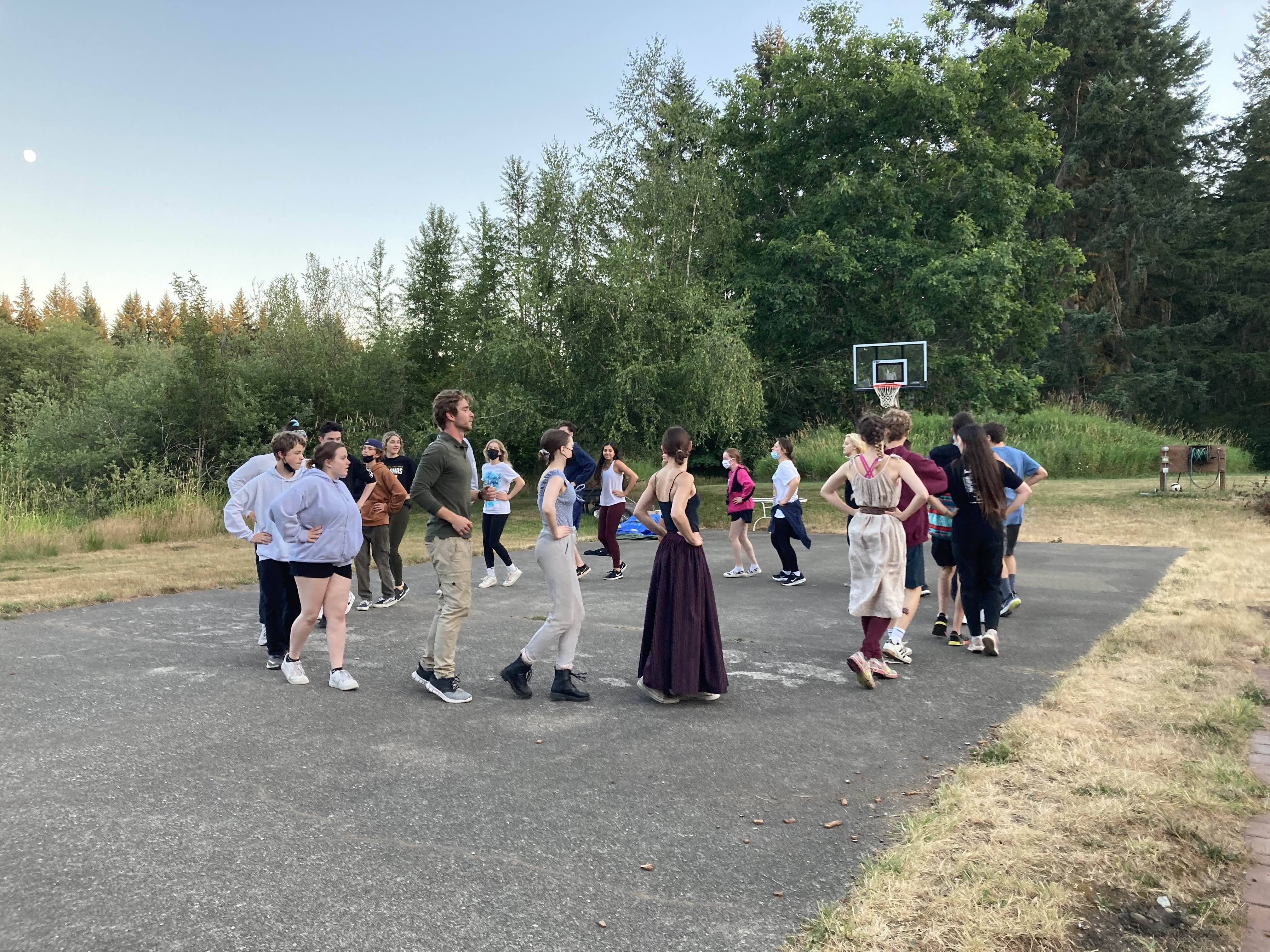
Dzīves mācības klasē pārrunājām jautājumu: Kuras latviešu kultūras daļas vai tradīcijas jums ir svarīgas? Vairums pieminēja latviešu saimi un draudzības, tautas dejas un dziesmas, un protams — latviešu ēdienu. Te var izlasīt Markusa Kalsona atbildi.
Dabas interešu grupā izpētījām Kursas apkārtni, iemācījāmies atpazīt vietējos putnus un to īpašās dziesmas. Lasījām latviešu ticējumus par dzīvniekiem un pilnmēnesi, ko redzējām pirms dažām dienām, piemēram:
“Kad skatās uz pilnu mēnesi, tad jāpaņem tas akmens, kas tai brīdī stāv zem kreisās kājas, un jāpaliek pa nakti pagalvē, tad tanī naktī parādīsies brūtgāns. Bet visu vakaru nedrīkst runāt.” /P. Zeltiņa, Ikšķile/
“Kad skudru pūļos ir daudz caurumi vaļā, tad būs sauss laiks; bet ja caurumi ir aiztaisīti, tad būs lietas. /Zemes Spēks, 1932/
Otrajā nedēļā arī turpinājām veidot šī gada folkloras video projektu. Mūzikas direktores Maijas Riekstiņas vadībā mācāmies par senlatviešu krustabām un ar to saistītajām tradīcijām, dainām un dziesmām. ŠīgadaKursas kori Maija ir augsti slavējusi!
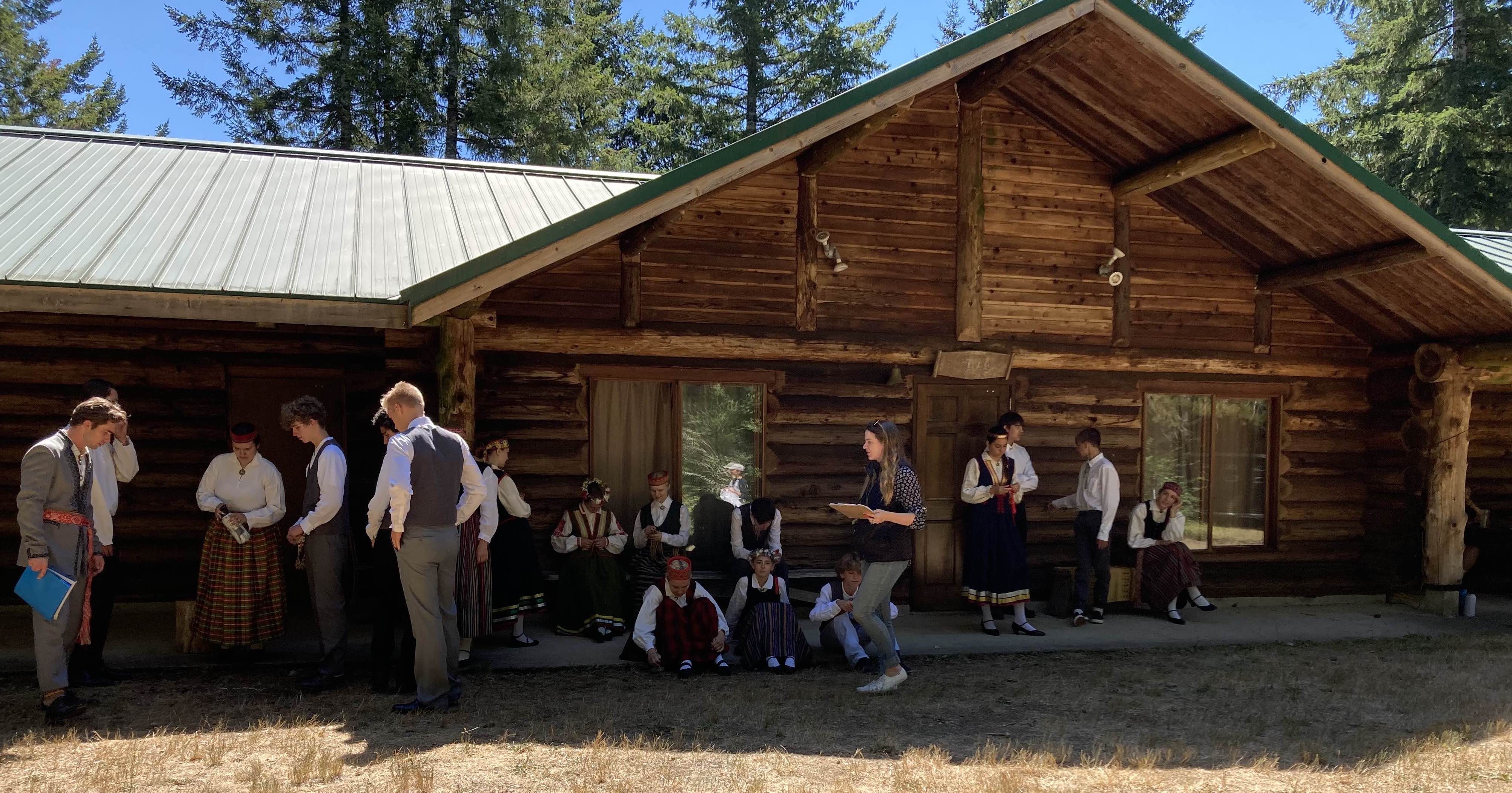
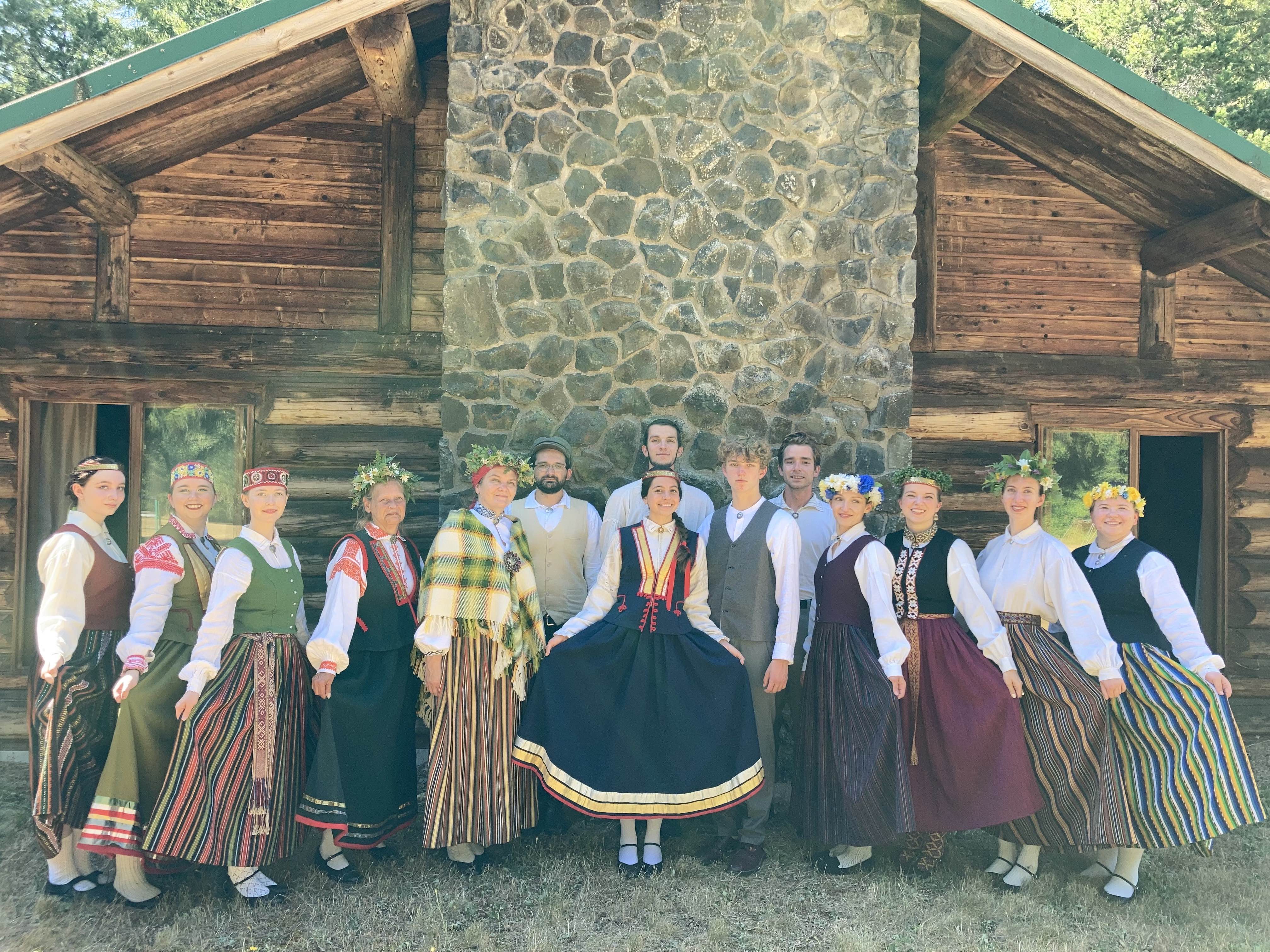
What parts of Latvian culture or tradition are important to you?
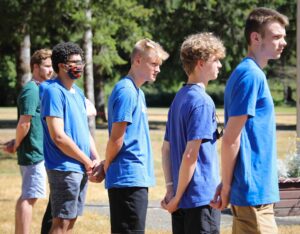 When I think of Latvian culture, I think of the variety of food, dances, songs and signs that have been around for generations.
When I think of Latvian culture, I think of the variety of food, dances, songs and signs that have been around for generations.
The dancing part of our culture has a special meaning because the clothing being worn has its own special meaning. There is special clothing the dancers wear that was made generations ago and survived DP camps, other nations trying to ruin our culture, and time. Every clothing piece has Latvian symbols on them that resemble a part of Latvia. Latvian symbols to me have significant amounts of meaning — I have a necklace with a Latvian sign which will forever remind me of my Latvian heritage and the memories held within it.
Although Latvian symbols have tons of meaning, songs have just as much meaning to them. Our Latvian ancestors made songs that don’t seem like much to an outsider, but a true Latvian knows the hidden meaning of them. I feel as if these examples of Latvian culture are what makes every Latvian feel connected in some way.
One thing that has survived many, many years is our Latvian food which was made off of the little resources we had.
— Markus Kalsons, Kursa 2021
Kursa 2021 Opening
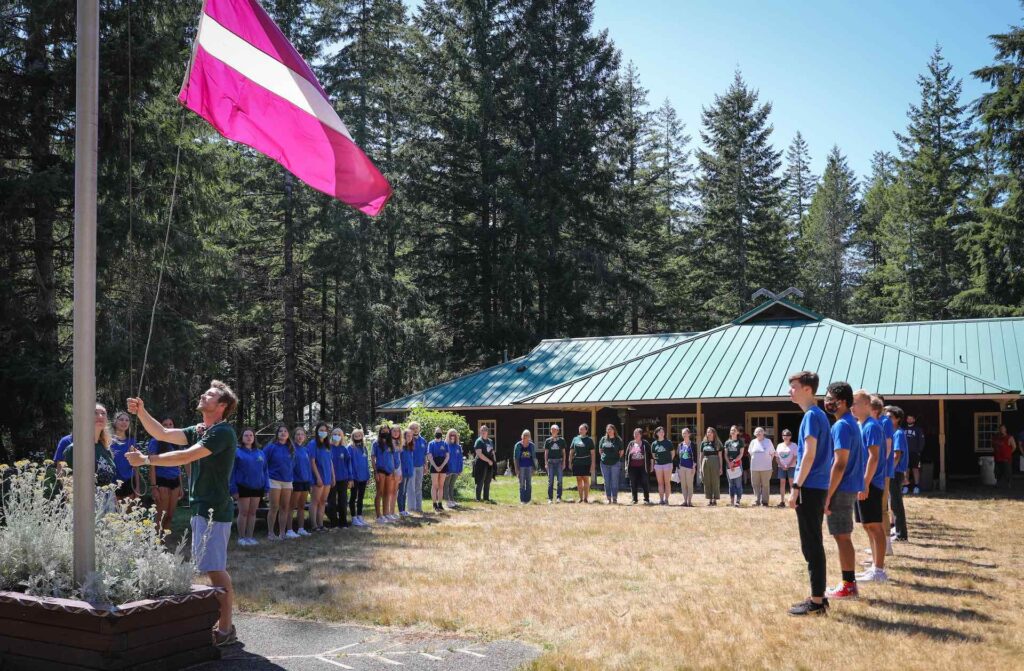 Director’s opening day speech
Director’s opening day speech
Dear Kursa students, teachers, staff and supporters — Kursa’s community — Sveiks, sveiks, sveiks Kursā!
My name is Indra Ekmanis, I am Kursa’s director, and I have the great pleasure of greeting you right here, at the West Coast Latvian Education Center, today. The Center is a place, where we all have the freedom to learn and experience our Latvian cultural heritage — our history, our language. For Latvians, as a people, the land and nature, has always been precious, and integral to Latvian identity. I invite you to recognize that today, we stand on the land of the Coast Salish peoples.
This is a place that we have longed for for two long years. How wonderful it is to see so many of you — and in 3D, not just behind a computer screen. Of course, COVID-19 has changed a lot in our world. We’ll also feel its impact here at Kursa, and some things may not be exactly as they have been. But with new challenges come new opportunities, and one of the most joyful opportunities is the chance to spend a Latvian summer here together.
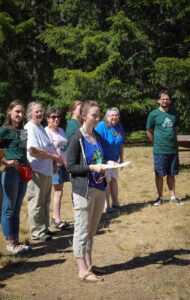 I started my time as Kursa’s director in 2016 — a year of rebirth with only 12 students. This summer, after a year of quarantines and behind Zoom screens, 28 students will attend Kursa.
I started my time as Kursa’s director in 2016 — a year of rebirth with only 12 students. This summer, after a year of quarantines and behind Zoom screens, 28 students will attend Kursa.
I am fortunate to have the chance to end my term as Kursa director in this new year of rebirth with all of you — and especially with our graduating students. Like for them, closing out a Kursa chapter is bittersweet. But I have great hopes for Kursa’s future — I know it will be bright, joyful and that Kursa will continue to develop and grow with all of you. This place, this school, is a critical part of our Latvian community in the US, and of Latvia’s diaspora education. It will continue to be so, because we are — all of us — part of Latvia.
And who exactly are we all? Let’s have some introductions! Your counselors: Katriāna Zommers, Marika Gulēna-Taube, Valdis Birznieks and Tālivaldis Bērziņš. Your audzinātāji are responsible for your safety — please make their jobs fun and easy!
Kursa’s subject matter and interest group teachers: Maija Riekstiņa, music and folklore director; Viktors Pūpols, history and chess teacher; Melisa Līgure, integrated language teacher, who will instruct a program written by Reinis Vējiņš, Dace Melbārde, Krista Brauere and Ilze Gaigala, our teachers from Latvia; Sara Celms and Ardath Miller, lifeskills teachers; Vilnis Humeyumtewa, folk dancing teacher; Māra Linda, koklēšana instructor; Shelley Ekmanis, ceramics instructor; Juliet Farr, art instructor; later we will be joined by Andris Rūtiņš (jewelry making), Lolita Krievs (naturist interest group) and Ariāna Ule (Latvian traditions).
Those who will be caring for our environment and our stomachs: Deborah Petzal, food services manager; Miķelis Kramēns, Bonnie Way, Peter Kraushaar, Jānis Riekstiņš, Aija Reimane, Callahan Farr, Ēriks Zālītis, Ēriks Rauda, and Dzidra Freiman.
With me in administration: Iveta Āva, operations manager, and Diāna Atvars, administrator.
Thank you also to Alex Mohseni, our on-call doctor, and the board of the West Coast Latvian Education Center.
Thank you all for investing your time and skills in Kursa and Kursa students!
I also want to thank our supporters: the American Latvian Association — especially Education director Elisa Freimane and president Pēteris Blumbergs; the Latvian Ministry of Education and Science and the National Center for Education — especially Anta Lazareva; Daugavas Vanagi and the Lincoln association; the Latvian Foundation; the Latvian Association of the State of Washington; the Seattle Latvian Church and ladies auxiliary — especially Prav. Daira Cilne; and Printful, Latvia’s first “unicorn” which has supplied us with stylish Kursa gear.
And of course, we would like to thank our broader community, including all of you — without you there would be no Kursa. Thank you!
— Dr. Indra Ekmanis, Kursa director 2016 – 2021
Blessing from Prāv. Daira Cilne of the Latvian ev. lut. Church in Seattle in Latvian.
Kursa 2021 – Provisional plan

The West Coast Latvian Education Center board has been working to determine possibilities for this summer’s programming. We are excited to announce that we are tentatively planning to hold Kursa from July 11 to August 7, following Mežotne children’s camp.
We invite you to read our current COVID-19 mitigation plan (subject to updates), and submit your answers to our parent/student/staff survey about your interest in participating.
COVID-19
Our goal is to have a fun and engaging summer at Kursa, while creating a safe camp experience for all participants. As the COVID-19 situation is continuously changing, we will continue to monitor guidelines and recommendations and modify our plan as needed. Our current plan includes the following elements:
Pre-arrival
-
All participating adults must have received a COVID-19 final immunization (#2 in case of Pfizer or Moderna, #1 in case of J&J) no later than 14 days before the first day of Kursa. Proof of immunization will be required.
-
All participants (adults and students) must submit proof of negative COVID-19 test (antigen or molecular [not antibody]) administered within 72 hours prior to arrival at Kursa.
-
Anyone traveling by plane or other mass transit to camp must wear a well-fitted N95, KN95 or similar respirator mask while in transit (a regular cloth mask is not sufficient). This is to help reduce the risk of contracting COVID-19 and/or other infections in route. Given that: 1) any respiratory illness (and certain other symptom classes) will be suspected of being possible COVID-19, 2) real-time testing is both difficult to coordinate and has limited reliability, and 3) the limited ability of Kursa to manage any sick camper, we anticipate that any camper with symptoms of possible COVID-19 will be asked to be picked up by parents and removed from camp within 72 hours. Therefore, it behooves prospective campers and participants to take extra precautions in the two weeks prior to camp in avoiding contracting an infection.
-
We will have a structured camper drop-off workflow to limit the exposure of camp participants to parents and others who are dropping off campers. More details to come.
During camp
-
A parent or other responsible adult party designated by the parent must be able to pick up a camper within 72 hours of notice in the case of illness.
-
Everyone must wear a mask. As we get closer to camp opening and CDC guidelines are updated for mask wearing, especially for immunized people, there may be exceptions. We will track local, state and federal recommendations closely and we will have more details on mask-wearing rules as camp approaches.
-
Everyone must observe camp sanitation requirements.
-
No visitors will be allowed, and once on site, participants may not leave and return. (No Walmart trips). Any participant who leaves camp without permission will be expelled and forfeit his/her camp tuition.
-
Everyone must participate in daily symptom and temperature checks, and, when necessary, additional COVID-19 testing.
-
Windows in the dorms will be required to remain open at all times.
WCLEC is thankful for our community of supporters, and we hope to see you at Kursa this summer!
Kursa online – November 14
Greetings this week of Latvian national holidays! We’re looking forward to seeing you Saturday, Nov. 14, at 9 am Seattle time.
We’ll chat in small groups, learn and talk through the October worksheet. We’ll also celebrate Latvia’s independence day — feel free to invite others along as well!
Kursa activities will be on the second Saturday of the month.
Uz drīz redzēšanos!
Kursas skolotāji
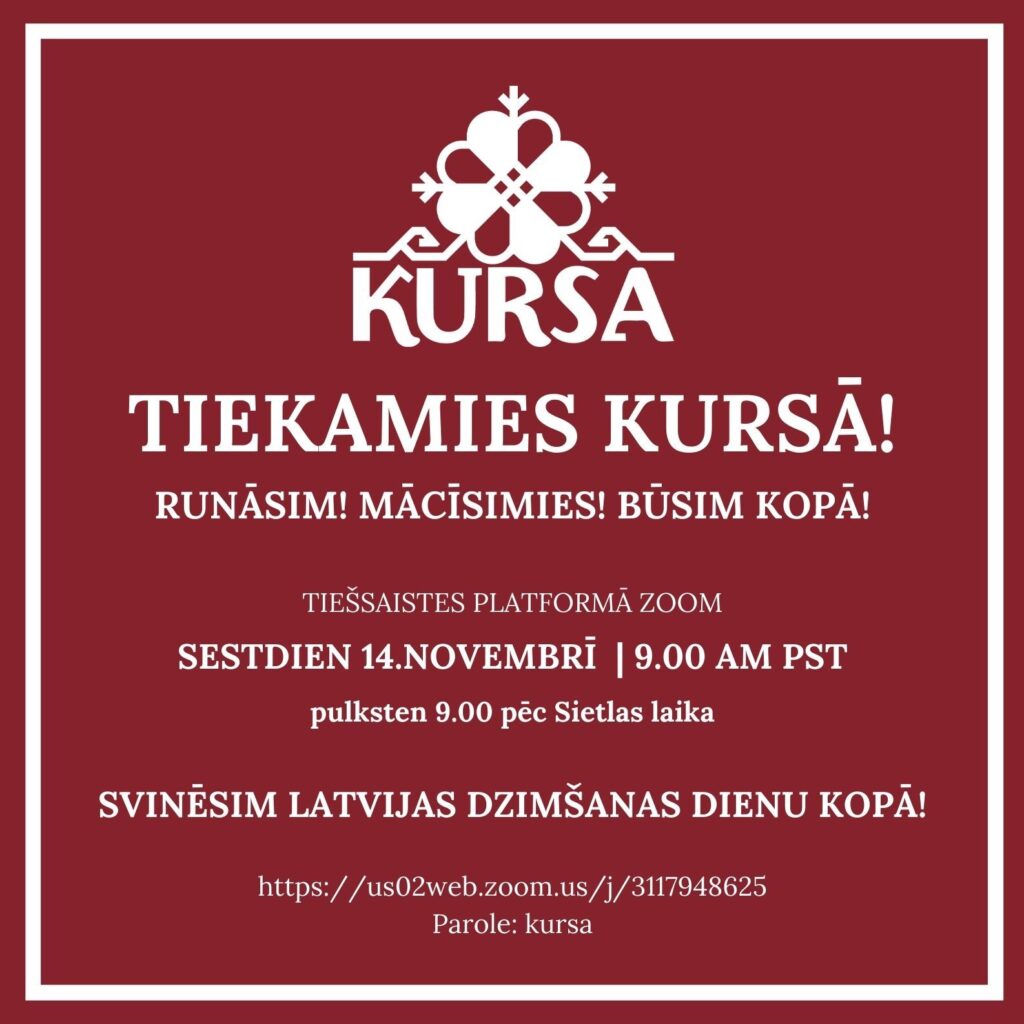
ALA support to Kursa
Kursa and the West Coast Latvian Education Center extend our sincere thanks to the American Latvian Association for their generous support of $3,000 for the Kursa summer high school program!
This funding comes in a critical year as Kursa pivoted to an online summer and academic year program that we have offered for free to families. ALA support is helping us maintain our connection with Kursa students with an integrated Latvian language, literature, arts and folklore-based program, as well as helping to offset some of the cost of infrastructure and facilities upkeep that continues, despite the pandemic. Read more about ALA’s $100,000 investment in Latvian schools and camps around the US here.
No sird pateicamies!
